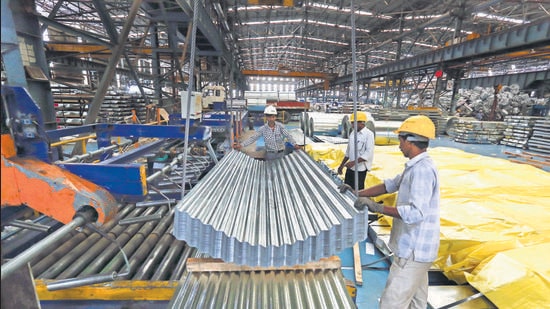Heat stress in India can reduce industrial output: Study
For every one-degree C rise in annual temperatures over average temperatures for the 1980-2000 period, Indian industrial plants likely produced 2% less revenue, according to a research paper co-authored by economists and experts from Indian Statistical Institute and the University of Chicago
For every one-degree Celsius (°C) rise in annual temperatures over average temperatures for the 1980-2000 period, Indian industrial plants likely produced 2% less revenue, according to a research paper co-authored by economists and experts from Delhi’s Indian Statistical Institute and the University of Chicago. The researchers used data from around 58,000 factories in India to arrive at the correlation.

With the government’s focus on transforming India into a manufacturing hub, the findings of the paper are significant.
Anant Sudarshan, South Asia Director, Energy Policy Institute, University of Chicago, said the effect of high temperatures on lower crop yields has been previously established. “This paper shows that rising temperatures can also hurt economic output in other sectors by reducing the productivity of human labour. The damage is greatest when already warm days become hotter,” Sudarshan said in a statement on Thursday.
The statement added if India wishes to succeed in becoming a manufacturing powerhouse using cheap labour, it needs to think hard about how to adapt to a hotter world.
“That 1°C rise over the baseline only puts a number to the possible impact on industrial output. But the effect of this temperature rise is more pronounced when warm days become hotter. So, the rise in average temperatures in [the] summer season directly impacts productivity,” said Sudarshan.
The paper, which has been accepted for publication in the University of Chicago’s Journal of Political Economy, said the losses are mainly due to a reduction in the output elasticity of labour.
Factory workers may produce less while at work due to heat stress and also be absent more often, according to the study.
The analysis of long-term national-level data for the study was supplemented with that on workers involved in cloth weaving, garment sewing, and steel industries to separately identify these two effects. The researchers found the output of individual workers and teams declines on hot days as well as in weeks with more hot days.
The cloth weaving factories studied are in Surat, the National Capital Region, Hyderabad and Chhindwara. The steel production data is from Bhilai.
The researchers obtained payment slips for each day and digitised these to generate a worker-level dataset of daily output and attendance. They also sourced weather data from public weather stations and India Meteorological Department to map the impact.
The multi-year study indicates that climate control in the workplace removes productivity declines, but not absenteeism possibly because workers remain exposed to high temperatures at home and outside.
E Somanathan, a professor at the Indian Statistical Institute, said in the absence of climate control, worker productivity declines on hot days. “...we spot absenteeism even for workers in factories with cooling facilities. When you compound that with limited adoption of climate control technologies in manufacturing industries, you know that we are dealing with a complex problem here.”
Somanathan added it is entirely possible that the industrial sector might respond to high temperatures by increasing automation and shifting away from labour-intensive sectors in hot parts of the world. “These adaptive responses may negatively influence wage inequality,” he said in a statement.
M Rajeevan Nair, secretary, ministry of earth sciences, said he has not read the paper, but they know the frequency, intensity, and duration of heatwaves are going up in central and northwest India as well as the heat-wave zone along the east coast. “New modelling studies are showing that even if we managed to keep global warming under 1.5°C, heat waves will rise. Heatwaves can be fatal, so we have to be very well prepared. India Meteorological Department and National Disaster Management Authority are preparing heat action plans for states.”
Get Current Updates on India News, Lok Sabha election 2024 live, Election 2024 along with Latest News and Top Headlines from India and around the world.



